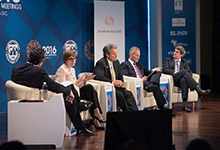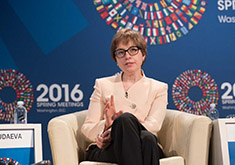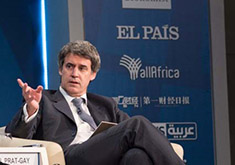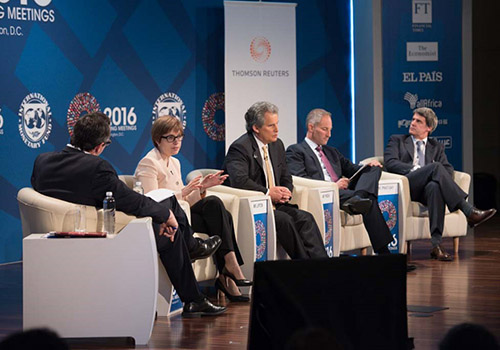
Typical street scene in Santa Ana, El Salvador. (Photo: iStock)
IMF Survey : Emerging Markets Gloom May Be Overdone, Panel Says
April 15, 2016
- IMF’s David Lipton sees “huge growth potential”
- Countries can accelerate growth with appropriate policies
- Panelists discuss outlook for oil, impact of further interest rate increases by U.S. Fed
The prospects for growth in emerging and developing nations may not be as gloomy as financial markets suggest, according to participants at a seminar during the Spring Meetings of the International Monetary Fund and World Bank.

IMF’s David Lipton (center) was joined by Alfonso Prat-Gay, (far right) Gene Frieda, and Ksenia Yudaeva. Axel Threlfall (far left), of Reuters, moderated the panel discussion (IMF photo)
2016 IMF-WORLD BANK SPRING MEETINGS
“When you’re at the crossroads and you’re just looking at the intersection, it can all look pretty dark,’’ said David Lipton, IMF First Deputy Managing Director. Still, “there’s huge potential for emerging countries to grow rapidly and be the engine of growth for the global economy,’’ he told participants at the seminar, Emerging Markets at the Crossroads.
Lipton’s comments came after the IMF, in its World Economic Outlook released this week, cut its forecasts for global growth amid deeper-than-projected contractions in Brazil and Russia, a continuing slowdown in China, and a sharp drop in the prices of oil and other commodities.
Emerging nations “need technology, they need investment, they need to educate their populations—that will make production grow,’’ Lipton said.
“There is no reason countries can’t accelerate growth with the right policies and the right international environment,’’ he said. “Part of it comes back to the role of the IMF and the role of the international monetary system. We need a world environment in terms of capital flows that’s encouraging rather than discouraging of emerging market growth.’’
No one answer for emerging market countries
Other participants, including officials from Argentina and Russia, agreed that, while emerging markets face risks, including the prospect of further interest rate increases by the U.S. Federal Reserve, many are well placed to withstand them. What’s more, while some countries, including Russia, have been hurt by declines in oil prices, others have benefited.

Ksenia Yudaeva: “We need to think about how to decrease volatility to increase growth” (IMF photo)
“There is no one answer for all kinds of countries right now,’’ said Ksenia Yudaeva, First Deputy Governor of the Bank of Russia. She said the outlook for Russia is improving as the oil and natural gas exporter adjusts to lower energy prices, and that the central bank may raise its forecasts for growth. “The economy is probably doing better than we expect,’’ she said. “So I already think that maybe we will be revising them upward.’’
The IMF cut its outlook for Russia this year, projecting the economy will shrink 1.8 percent, compared with a forecast for a 1 percent contraction in January. Russia’s economy has suffered from the drop in oil prices and international sanctions.
Lipton praised Russia’s economic management “in terms of monetary policy, exchange rate flexibility and attendance to budgetary issues.” But he added that the country “has plenty of work to do in trying to decide what the structure of its economy will be, how to diversify.’’
For investors, “there is focus on whether or not sanctions get scaled back in the summer, but beyond that investors are quite pleased with the way [Russia] has rebalanced so far,” said Gene Frieda, a partner and senior global strategist at Moore Capital.
Alfonso Prat-Gay, Argentina’s Minister of Treasury and Public Finance, said many emerging markets were well prepared for the global slowdown and market turbulence. With global interest rates at record lows following the financial crisis, emerging nations resisted the temptation to gorge on cheap debt, he said.
“The great policy news was that most of these countries were running disciplined fiscal policies, they were increasing reserves, they had floating [exchange rate] regimes rather than fixed regimes,” Prat-Gay added.

Alfonso Prat-Gay confident Argentina will achieve its goal of reducing inflation (IMF photo)
Prat-Gay expressed satisfaction with investor demand for Argentina’s debt after a U.S. appeals court on Wednesday cleared the way for a $15 billion bond sale to pay creditors from a 2001 default.
“There was already a lot of interest before the appeals court decision,’’ Prat-Gay said. “There’s a lot right now.” He added that it was unlikely the nation would sell additional bonds this year. Separately, he said he was confident that Argentina will achieve its goal of reducing inflation to about 25 percent because a decision to end subsidies for transport and energy will have only a temporary impact on prices.
The IMF is forecasting a mild recession this year in Argentina, South America’s second-largest economy, following growth of 1.2 percent in 2015.
Outlook for oil
Participants at the seminar expressed caution about the outlook for a rebound in oil prices as exporting nations prepare to meet in Doha, Qatar, on Sunday to discuss capping production.
“What I’m afraid of is that oil prices will continue to be volatile,’’ Yudaeva said. “We are trying to be cautious and not bet on a one-way direction in the oil price.’’
Argentina, a net oil importer, is preparing for a possible price increase by putting more emphasis on renewal sources of energy, Prat-Gay said.
The potential for further interest rate increases by the U.S Federal Reserve remains a risk for emerging markets, participants said.
“The whole market and global economic situation is still fragile,” Yudaeva said. “Volatility itself has an effect on growth. We need to think about how to decrease volatility in order to support growth.”

IMF’s David Lipton (center) was joined by Alfonso Prat-Gay, Minister of Finance of Argentina (far right) Gene Frieda, of Moore Capital Management; and Ksenia Yudaeva, Deputy Governor of the Central Bank of Russia. Axel Threlfall (far left), of Reuters, moderated the panel discussion (IMF photo)


